- Home
- Kelley Armstrong
Wherever She Goes (ARC) Page 10
Wherever She Goes (ARC) Read online
Page 10
Fifteen.
Is that when Kim had Brandon? Ejected from her family for a teen pregnancy? No. The dates don’t work. I’m sure Brandon was no older than five, and according to this timeline, Kim would have been twenty-three when she died, meaning she’d had Brandon when she was about seventeen.
While I don’t find more recent photos of Kim on Ellie’s page, I do find references to her. Old friends periodically ask how Kim’s doing, and Ellie replies that she’s fine, living her own life, but they’re in contact and she’s doing great. Sometimes she’ll say she visited with “Kimmy” last month or that she just talked to her.
Still, there are no recent photos of them together. No updates saying that Ellie was going to visit her sister or that Kim was coming over. If I hadn’t seen those phone records, I might think these claims of contact were fake. But they did talk, weekly, often for an hour or more. That isn’t two sisters who’ve drifted apart and only exchange cards at Christmas.
There are a couple of instances where someone asks “Where’s Kimmy living these days?” . . . and Ellie doesn’t reply, as if she missed the question. In another one, a guy from Cedar Rapids asks if he can get in touch with Kimmy, and Ellie answers that her sister isn’t on Facebook. When he asks for an email address, she pretends not to see the question.
There are also no mentions of Brandon. No suggestion that Kim has a child. And that, I am sure, is not accidental.
Ellie is guarding her sister’s privacy. Because her sister is in hiding. Using a fake name. Concealing her child from the world. Staying in close contact with her sister, but otherwise cutting all ties with her former life.
I imagine a world where I had someone I could keep in touch with. A sister or a brother or even a cousin I couldn’t bear to cut from my life when I went on the run. I tell myself it’s better this way—beholden to no one, endangering no one—but that’s a lie. I envy Kim for having Ellie in her life.
That’s when I realize Ellie is out there, going about her Saturday in South Dakota, with no idea what’s happened to her sister. No idea her sister is dead.
I have Ellie’s phone number. I could call. But that’d be wrong. As hard as it will be to hear this news from the police, it wouldn’t be any easier from a stranger. Let Ellie continue her weekend unaware. Let her enjoy it. The news will come soon enough now that I have Kim’s real name.
I do not stop with that name. I can’t. I feel like I’m catching snippets of Kim’s life, just enough that my analytical brain cannot help filling in the gaps and making educated guesses. It’s like catching a glimpse of an elegant security system and think I wonder if I can hack that.
I can’t walk away now. I need to know, to satisfy my curiosity. What I’m doing here is perfectly safe and legal. I’m sitting in coffee shop number three, drinking a decaf latte, and browsing the Web, like half the other people here. I expected to spend the day with Charlotte, so I have no other plans. I can continue working this puzzle.
Girl from Cedar Rapids seems to drop out of family life at fifteen. She has a child two years later. A child she hides from the world, as she lives in a Chicago suburb under an assumed name. Yet she maintains contact with her older sister, who keeps her secrets for her.
There are patterns in life. Old stories, often told. Personal tragedies rendered almost banal by their very commonness. I see one of those in Kim’s story, and I want to chide myself for being so unimaginative. The truth is, though, that I am very good at recognizing patterns, at predicting cause and effect. I remember in high school, we’d done some aptitude test measuring our intellectual strengths. Mine was logical reasoning, and when my guidance counselor saw the results, she actually double-checked to be sure she was reading them right. This is what makes me so good with computers. I can analyze, and I can foresee outcomes, and it’s hard for me to understand why others cannot.
When I took that bullet to my shoulder, I didn’t for one moment think Why me? I was not shocked. Not even surprised. This was one of the potential outcomes. So was jail. Or betrayal. Or death. The others had been outraged on my behalf. I’d laughed at them.
After I split with Paul, I’d gone to a group for newly separated women. I could say I was seeking support, but really, I just wanted information. I wanted to learn from their experiences. I remember one woman who’d been shell-shocked by her separation . . . which she instigated. She’d given her husband an ultimatum, and he chose divorce. Somehow, that surprised her. She’d only wanted him to know she was serious, and threatening divorce seemed the way to do it.
That baffled me. When I told Paul our marriage didn’t seem to be working, of course I wanted it to be the wake-up call that would save us. But I knew it might also be the excuse he needed to jump in and say “I agree.” Which is exactly what he did, and as much as that hurt, I would rather know how he felt and set him free to be happy. I love him. I’m not going to trap him in an empty marriage.
So in Kim’s story, I see a pattern. There’s more to it. I have noticed that while Ellie talks about going home to see her mother, there’s no mention of her father. According to condolences in her timeline, he died three years ago, yet she never mentioned the death, responding to those messages with a simple “Thank you.”
My dad and I had our differences—blow-out fights, the front door slammed, me spending the night at friends’—but I loved him like I loved no one else before Paul came along. When my father died, I was inconsolable with grief and rage. The chill I see on Ellie’s page speaks to more than a strained relationship. Death heals those wounds. This one did not.
I study the last photos of Kim. At her fifteenth birthday celebration, it is obvious she’s putting on a good face for her big sister—home from South Dakota and very pregnant—but I do not miss the look in Kim’s eyes, the one that says she has already, in her mind, hit the road, putting as much distance as she can between her and a bad home life.
I know I might be wrong. I might be carelessly stuffing Kim into a convenient box. Girl with harsh home life flees and ends up in an even worse place, addicted to drugs, hooking up with the wrong guy, pregnant at seventeen. Then she has a maternal-instinct wake-up call, takes the kid, and flees, living under a false name with a child hidden from his daddy.
Old story, often told.
So I take Kim’s real name and what few details I can glean, and I set about trying to prove myself wrong. Find the piece of evidence that says I’m full of crap, seen too many movies, read too many novels.
There are traces of Kim Mikhailov online. Nothing since she was fifteen, but I expect that. I skim through those bits and pieces—high school website archives, abandoned social media footprints—and put them aside for later. I’m looking for . . .
I find what I’m looking for in a newspaper article dated two months after Kim turned fifteen. LOCAL TEEN MISSING. The article has been written with obvious reluctance by a journalist who’s convinced he’s dealing with a teen runaway, but has been persuaded to mention it briefly and make the family happy.
Kimberly Mikhailov disappeared one night after an argument with her father. Her mother admitted this wasn’t the first time she’d left but said she always returned the next day. This time, she didn’t. After two weeks, the family was desperate for any word from her. Mom and sister, Ellie, pleaded for news, any news.
I see no mention of her dad.
I find another scrap online, dated two years later. The passing mention of a divorce case, nothing newsworthy, just a tidbit in a list of court proceedings. The dissolution of a marriage between Kim and Ellie’s parents. I find her father’s obituary, too, asking for donations to be made to the American Liver Foundation and ANON. An alcoholic’s death.
Old story. Often told.
After that I begin to reconstruct Kim’s missing past. Which sounds like I’m some kind of detective prodigy. Give me an hour on the Web, and I’ll give you the bio of a woman who’s been in hiding for ten years! It’s not like that. I’m chasing threads, vapors really,
of the trail she’s left. A comment here. A mention there. Spot the faint trace of smoke and follow it for miles, only to find a long-dead campfire at the end, the stories told around it evaporated. I am running through the internet pathways for hours, popping pain meds when my shoulder screams for mercy, setting timers on my watch so I don’t overstay my welcome, moving from shop to shop.
I know how to use this piece of metal to my advantage, how to stalk the Web for my prey with every tool at my disposal. Image recognition is my best friend here. Here is this picture of a fifteen-year-old girl. Find me more like it.
The tool I’m using isn’t a free Web service either. A couple of years ago, I saw a news piece about a “suburban housewife” who’d been exposed as a former drug mule by a partner in crime stumbling over her photo online. That sparked a fresh wave of my paranoia, and I’d gone through a period of obsessively checking for my photo online, untagging it on Facebook and so on. I found the best photo-recognition software available, and I still have access to it.
Even that entails wading through photos of blond girls until I have to make a pit stop at a pharmacy for eye drops. There is something about Kim’s face that sets it apart, though, things I hadn’t fully processed when I first met her. Wide-spaced eyes. A widow’s peak. A nose that’s just a little crooked, as if it’s been reset. A tooth chipped and never repaired.
I excavate the mountain of near hits and find Kim Mikhailov at the bottom, in an advertisement for “barely-legal exotic dancers” in LA. At the time, she’d been sixteen, wearing enough makeup that men could tell themselves she was older, but they’d know better.
I then find her in another photo, dated six months later, when she’d have just turned seventeen. She’s under the arm of a guy who looks about twenty. She’s dressed in a sheath dress that barely covers her top or bottom, and the photo catches her tugging down the back. I see marks on her arm now, but there’s no drugged-out vacancy behind those eyes. Instead, there’s a wide-eyed . . . Not innocence. I didn’t see that in her even at sixteen.
This look is one that’s staring wide-eyed at the world, feeling it stare back and not enjoying the sensation. She’s ducked down into the man’s arm, taking shelter there. He’s well-dressed, sleek-haired, looking very pleased with himself.
The photo appears on an old Facebook page for a defunct club. There’s no name attached to either Kim or her date. It’s just part of a series of photos taken at the opening celebrations. But when I search on the guy’s face, I get an exact copy of this photo on a personal Facebook page, a private one that I have to hack to access. There the same photo has a caption: “The boss & his girl, looking fine.”
Dig, dig, dig. Find the connection. Endlessly chase those connections.
The guy who owns this page once worked for Kim’s date, and the fact that he called her the boss’s “girl” suggests she was more than a casual date.
I find the answer with less work than I would have expected . . . because the guy who owns the Facebook profile once worked for the club where Kim danced. That club had been owned by two guys. One of them died years ago of a drug overdose. The other’s name is Denis Zima. He’s the one in the photo with Kim.
It doesn’t take much research to learn that Zima wasn’t just an entrepreneurial nineteen-year-old with the cash to open a strip club. He’s the son of a guy with links to the Russian mob. He started the club with a friend from high school—the one who died of an overdose. That club, where Kim worked, closed a year later, and Zima started a chain of nightclubs without the strippers and underage girls.
I’m not sure this gets me anywhere new. Yes, Denis Zima seems to have been Kim’s boyfriend at the right time to make him a candidate for Brandon’s daddy. And he’s definitely a shady character. But that’s for the police to investigate.
I’m about to close my browser when I see the results of my last search, looking for more information on Denis Zima and his clubs. It’s the third listing from the top, the search engine picking up my current location and highlighting results that might interest me most.
It’s an advertisement announcing the opening of Zima’s fifth club, Zodiac Five. Right here in Chicago. While it’s been operating for the past week, it hasn’t had an official grand opening. That’s tonight.
I do not make plans to go to the Zodiac Five grand opening. That would be crazy. I am not—I am rarely crazy.
The point is that, according to the article, Zima is in town for the opening. Coincidence that he’s here around the same time his ex was murdered? I have no idea. I’ll leave that to the police. I’ll let them know about Zima when I give them Kim’s name. That doesn’t stop me from periodically pausing my searches to look for any progress on the murder case, hoping that I’ll see something new. That I’ll find proof the police have followed my lead and identified the murdered woman, at least as Kim Mason. When I don’t, I’m frustrated, and it only furthers my fear that Officer Jackson blocked my tip.
It doesn’t help that Jackson has left two more increasingly terse “Call me back” messages. Before I leave Chicago, though, I make a call of my own, after hunting down a pay phone. I dial the Oxford Police Department tip line. This time, I don’t bother with the preamble.
“Your dead woman is Kimberly Mikhailov,” I say. “She’s been living here as Kim Mason. She’s originally from Cedar Rapids, and she has a son named—”
“Please hold.”
“What? No. You don’t understand. I know the identity of the woman shot in Harris Park this week. Her name—”
The phone is ringing, my words unheard. I wait, seething. I understand Oxford is a small city, but putting a tipster on hold is unbelievably—
“Laila Jackson,” a woman’s voice says.
I freeze.
“You have the identity of the woman murdered in Harris Park?” she prompts.
“Yes . . .” I say, dropping my voice an octave.
“Is this Aubrey Finch?”
I hang up. Then I stand and stare at the pay phone.
This can’t be happening. It’s like something out of a B-grade thriller, the kind I’d watch and roll my eyes at, saying, “Real cops wouldn’t do that.”
Or would they? Yes, from my point of view, I’m being blocked from giving the police a vital clue toward solving a crime. To Officer Jackson, though, I’m an attention-seeking nutjob, and she is not going to let me waste one moment of the department’s time.
There are people like the ones she’s pegged me for. People who fixate on the police and fancy themselves thwarted law officers. Or those who want their fifteen minutes of fame.
How do I convince Jackson that isn’t me? I keep thinking I have the evidence to do that . . . only to be stopped from delivering it.
Paul.
There’s no pretending anymore. I really need Paul’s help.
Except that asking for his help risks exposing my secrets. If he found out about my past, that would endanger my chances of joint custody.
I won’t give up my daughter. I’m sorry, Kim. I’m sorry, Brandon. I just won’t.
I will, however, keep trying to solve this dilemma. I spend the ride home coming up with scenarios. My best bet is Officer Cooper. I must find a way to get to him . . . circumventing his bulldog partner, Laila Jackson.
Email. That’s the answer. Find Cooper’s personal email and send him everything. Include photos and screenshots. Send him evidence that, once seen, he cannot unsee, cannot deny.
I return to my apartment. It’s after eight, and I need dinner—my stomach is complaining from the nonstop coffee and pastries. I’ll pop in here and then go hang out in a local coffee shop, buy something relatively healthy and send that email.
There, that’s my night sorted. Afterward maybe I’ll even rent a movie and try to distract—
I’m stepping out of the stairwell when I spot a figure at my apartment door. I flash back to Thursday and think it’s Paul again.
It’s not.
It’s Officer Jackson.
She’s in civilian clothes—jeans, heeled ankle boots, and a stylish leather jacket—and she’s standing outside my door, browsing on her phone. Killing time. Waiting for her quarry to return.
I back up fast, ease open the stairwell door, and retreat as quietly as I can. I go straight for my car, and I don’t pause to think until I’m a few blocks from home. Then I pull into a strip mall, park, and sit there, hands on the steering wheel as I stare out the windshield.
I can’t make an end run around Jackson to get to Cooper. She won’t let me. For whatever reason, Laila Jackson has made “stop Aubrey Finch” her mission, and she’s locked fast to it until I back off.
I will not back off.
So what do I do now? Check into a hotel for the night to avoid her? Paul will be bringing Charlotte to my apartment in the morning.
That’s fine—she won’t still be there come morning. I just need to find something to do for a few hours, something that will help bolster my case.
Like what? I have Kim’s name. I have her bio details. I even know who might be the father of her child. What more can I get?
I keep thinking of the club’s grand opening tonight. Which is, again, crazy. What do I hope to gain there? Get a look at Denis Zima and confirm he’s Brandon’s father? A visual scan is hardly a DNA test. So what would I gain from going to that club tonight? I have no idea. I just know that I’m frustrated and restless, and there’s a police officer staking out my apartment door, and I have time to kill and . . .
And I know none of that is a reason. Excuses, that’s all I have. The truth, I suspect, is that I’ve been fighting this urge ever since I saw that ad. I have no idea what I expect to accomplish at Zima’s club, but I’m going.
Which is crazy.
And, right now, I don’t care.
Being unable to get into my apartment means I can’t get ready there. Not that it matters much. Nothing in my closet these days is clubworthy. I did have a few dresses, back when I met Paul, and my coworkers could occasionally drag me to a club. That isn’t Paul’s scene, though.

 The Calling
The Calling Darkest Powers Bonus Pack
Darkest Powers Bonus Pack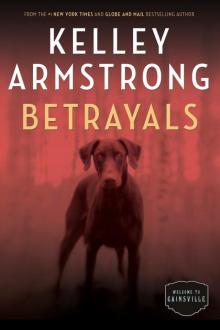 Betrayals
Betrayals Sea of Shadows
Sea of Shadows Rough Justice
Rough Justice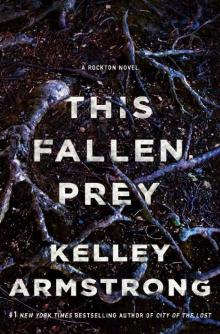 This Fallen Prey
This Fallen Prey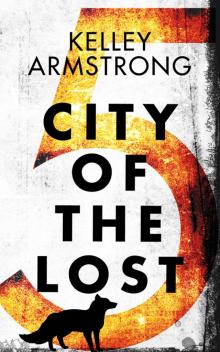 City of the Lost: Part Five
City of the Lost: Part Five Perfect Victim
Perfect Victim Dime Store Magic
Dime Store Magic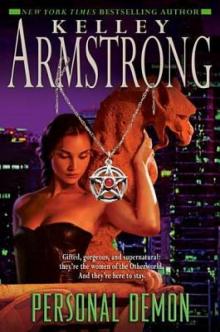 Personal Demon
Personal Demon Haunted
Haunted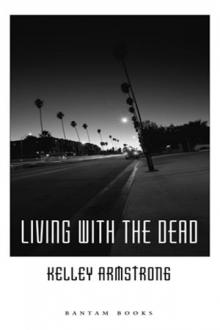 Living With the Dead
Living With the Dead Visions
Visions The Summoning
The Summoning Broken
Broken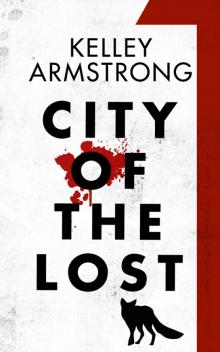 City of the Lost: Part One
City of the Lost: Part One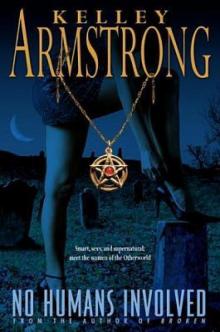 No Humans Involved
No Humans Involved The Awakening
The Awakening The Reckoning
The Reckoning The Gathering
The Gathering Bitten
Bitten Thirteen
Thirteen Gifted
Gifted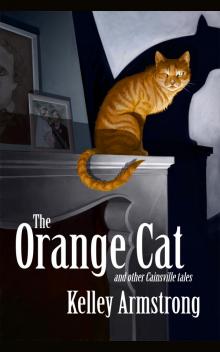 The Orange Cat and Other Cainsville Tales
The Orange Cat and Other Cainsville Tales Darkest Powers Bonus Pack 2
Darkest Powers Bonus Pack 2 Rituals
Rituals Waking the Witch
Waking the Witch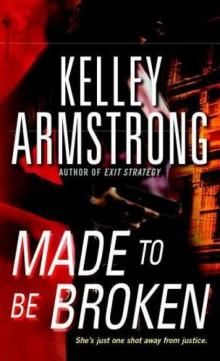 Made to Be Broken
Made to Be Broken Lost Souls
Lost Souls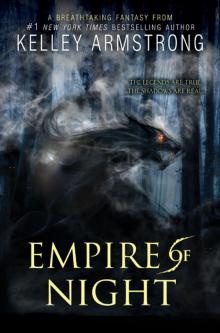 Empire of Night
Empire of Night Wild Justice
Wild Justice Double Play
Double Play Alone in the Wild
Alone in the Wild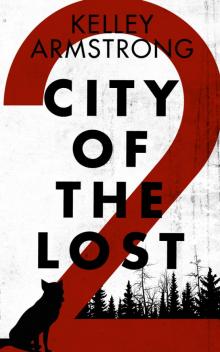 City of the Lost: Part Two
City of the Lost: Part Two A Stranger in Town
A Stranger in Town Watcher in the Woods: A Rockton Novel
Watcher in the Woods: A Rockton Novel Atoning
Atoning Spellbound
Spellbound Wolf's Bane
Wolf's Bane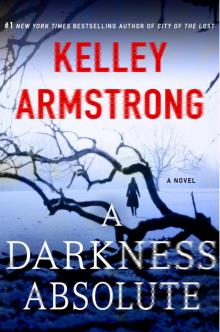 A Darkness Absolute
A Darkness Absolute Ballgowns & Butterflies: A Stitch in Time Holiday Novella
Ballgowns & Butterflies: A Stitch in Time Holiday Novella Wherever She Goes
Wherever She Goes A Royal Guide to Monster Slaying
A Royal Guide to Monster Slaying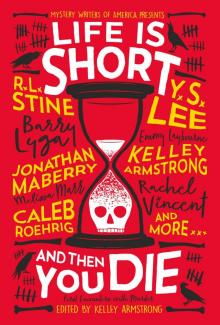 Life Is Short and Then You Die
Life Is Short and Then You Die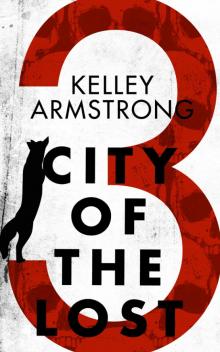 City of the Lost: Part Three
City of the Lost: Part Three Frostbitten
Frostbitten A Stitch in Time
A Stitch in Time Industrial Magic
Industrial Magic Wherever She Goes (ARC)
Wherever She Goes (ARC) Snowstorms & Sleigh Bells: A Stitch in Time holiday novella
Snowstorms & Sleigh Bells: A Stitch in Time holiday novella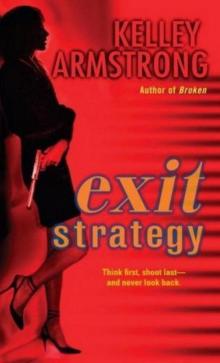 Exit Strategy
Exit Strategy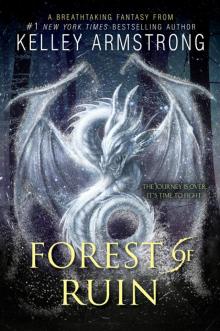 Forest of Ruin
Forest of Ruin Cursed Luck, Book 1
Cursed Luck, Book 1 The Gryphon's Lair
The Gryphon's Lair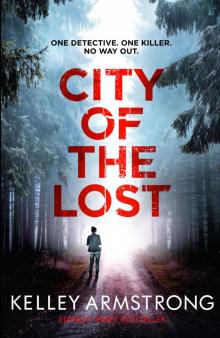 City of the Lost
City of the Lost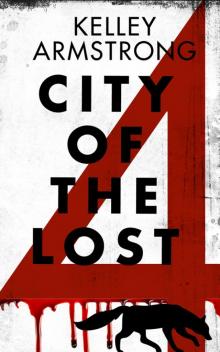 City of the Lost: Part Four
City of the Lost: Part Four Deceptions
Deceptions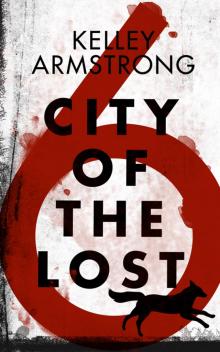 City of the Lost: Part Six
City of the Lost: Part Six Urban Enemies
Urban Enemies Stolen
Stolen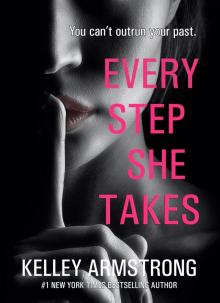 Every Step She Takes
Every Step She Takes Portents
Portents Wolf's Curse
Wolf's Curse The Unquiet past
The Unquiet past Omens ct-1
Omens ct-1 Cruel Fate
Cruel Fate The Calling dr-2
The Calling dr-2 The Awakening dp-2
The Awakening dp-2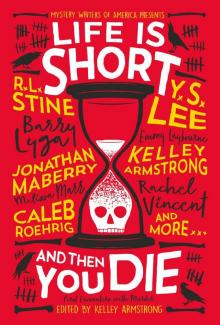 Life Is Short and Then You Die_First Encounters With Murder From Mystery Writers of America
Life Is Short and Then You Die_First Encounters With Murder From Mystery Writers of America Goddess of Summer Love: a Cursed Luck novella
Goddess of Summer Love: a Cursed Luck novella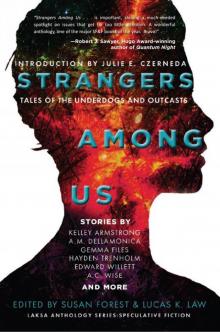 Strangers Among Us
Strangers Among Us The Gathering dr-1
The Gathering dr-1 The Rising dr-3
The Rising dr-3 The Summoning dp-1
The Summoning dp-1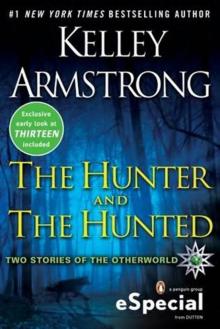 The Hunter And The Hunted
The Hunter And The Hunted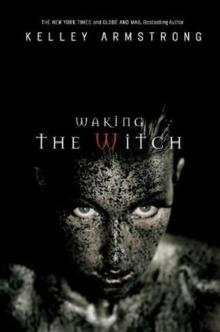 Waking the Witch woto-11
Waking the Witch woto-11